Clovelly |
|
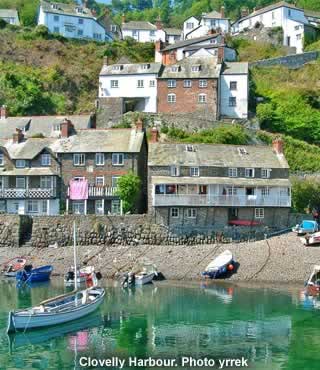 |
|||
A beautiful little fishing village on Devon's north coast |
||||||
Listen to this article |
||||||
|
||||||
In the mid 1900s, Clovelly was known as being a beautiful little fishing village on Devon's north coast, looking out over the Bristol Channel. Incredibly, here in the 21st century, very little has changed. Other places have grown, updated, and modernised, but Clovelly is different - a visit here is like visiting the past. |
||||||
This achievement is largely down to the efforts of the area's private owners, who work hard to keep the place looking as it does. You'll learn more about Clovelly's history and maintenance by watching the video presentation on show at the visitor centre - which is situated at the entrance to the village, and is usually the first port of call for most tourists. |
||||||
After this, you'll enter the village, and immediately find yourself at the top of its main street - an old, uneven, cobbled lane that forms the centre of the entire settlement. It's particularly notable because it's so steep! Clovelly is actually built into a cliff that's over a hundred metres tall, and it makes that descent in less than a kilometre. |
||||||
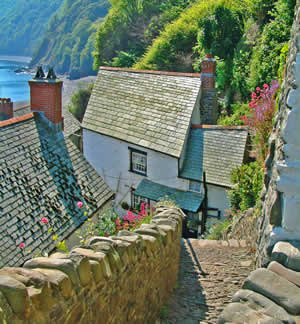 The top of the Main Street. Photo Yrrek |
||||||
This makes for a tricky walk, but it's worth it for the unique sights and views. The village's houses are mostly 16th century whitewashed cottages, surrounded by fuchsias, geraniums, and other flowers. Traffic is banned from the main road, making for an even more pleasant atmosphere. In the past, donkeys were used for travel and transport - and in fact, many of them are still here. In the summer, they often give rides to children, and sometimes they're still used to carry travellers' luggage up the hill. But most of the time, they're content to just pose for photographs. |
||||||
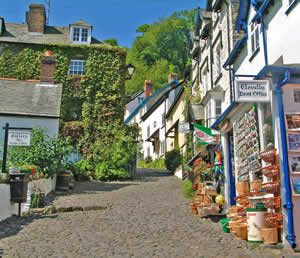 Clovelly Main Street. Photo Yrrek |
||||||
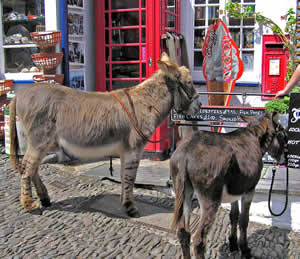 Donkeys carrying luggage and children. |
||||||
In the present day, most of Clovelly's goods are transported via sledge, which makes for an unusual sight - but it is a quick and easy method, especially when going downhill! Unsurprisingly, even without luggage, walking back up to the top of the village is a tiring job. Luckily, there is a Land Rover taxi service, which uses a back road to ferry people up to the visitor centre in comfort. |
||||||
Of course, when you reach Clovelly's shore, at the bottom of the hill, you won't want to turn around straightaway. This is the site of the quay, which has been home to active fishing boats for hundreds of years. In its heyday, a single day's catch could bring in nearly 10,000 fish! Things are a lot less industrious today, but the boats still set sail most mornings, and fresh fish can still be sampled in the village's restaurants. Visitors can also go on fishing trips for themselves, or take part in other activities such as pleasure cruises, or even diving with seals. If you don't fancy heading out onto the water, you can still step out onto the beautiful, curved, dry stone pier, which is a perfect location for looking out to sea, as well as back at the village's ascending buildings. |
||||||
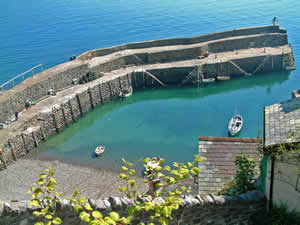 The harbour wall and quay. Photo Yrrek |
||||||
Clovelly's shore is part of one of England's most attractive sections of coastline, which means that there is easy access to a number of spectacular and enjoyable walks. The longest and most well-known National Trail in the country, the South West Coast Path, also passes by very close to here. Of course, heading out on one of these walking trips would mean leaving the village - and after you've seen it, that might prove to be a bit more difficult than you imagined. |
||||||
|
||||||
Clovelly Car Park & Visitor Centre (at the top of the hill). Clovelly, Devon, EX39 5TA. Tel: 01237 431781. |
||||||
|
Pocket Britain is optimised for use on a smartphone or tablet with internet access. All content is subject to copyright. All reasonable methods have been used to ensure information supplied is accurate at the time of publication. However, it is advisable to check information before relying on it. Privacy Policy |